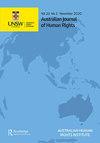Becoming an internally displaced person in Australia: state border closures during the COVID-19 pandemic and the role of international law on internal displacement
Q1 Arts and Humanities
引用次数: 0
Abstract
ABSTRACT In response to COVID-19, Australian state and territories have, at various times, restricted entry to returning residents. Consequently, many people have been unable to return to their homes, some for significant periods. While there have been discussions of the human rights implications of COVID-19 international travel bans and lockdowns, there has been little consideration of the application of international human rights law to those stranded by internal border closures. In this paper, we contend that these ‘stranded’ people are internally displaced persons (‘IDPs’) within the meaning of international law and examine how international law on internal displacement can inform domestic human rights law and processes. In doing so, this paper contributes to scarce scholarship on IDPs in higher-income nation-states and internal displacement associated with pandemics. We argue that while internal border closures were implemented to reduce the spread of COVID-19, the nature of the restrictions and the manner in which they were implemented were a disproportionate interference with rights to freedom of movement, family unity, education, healthcare and culture. Our analysis has lessons for responses to disaster displacement (a phenomenon likely to increase with acceleration of climate change), future pandemics and central themes in international scholarship on IDP protection.成为澳大利亚境内流离失所者:新冠肺炎大流行期间国家边境关闭以及国际法在国内流离失所问题上的作用
为应对COVID-19,澳大利亚各州和地区在不同时期限制了返回的居民入境。因此,许多人无法返回家园,有些人在很长一段时间内无法返回家园。虽然已经讨论了COVID-19国际旅行禁令和封锁对人权的影响,但很少考虑将国际人权法适用于因国内边境关闭而滞留的人。在本文中,我们认为这些“滞留”的人是国际法意义上的国内流离失所者(“IDPs”),并研究了关于国内流离失所的国际法如何为国内人权法和程序提供信息。在这样做的过程中,本文为高收入民族国家的国内流离失所者和与流行病相关的国内流离失所者提供了稀缺的学术研究。我们认为,虽然为减少COVID-19的传播而实施了内部边境关闭,但限制的性质和实施方式不成比例地干扰了行动自由、家庭团聚、教育、医疗保健和文化等权利。我们的分析对应对灾害导致的流离失所(这种现象可能随着气候变化的加速而增加)、未来的流行病以及保护国内流离失所者的国际学术研究的中心主题具有借鉴意义。
本文章由计算机程序翻译,如有差异,请以英文原文为准。
求助全文
约1分钟内获得全文
求助全文
来源期刊

Australian Journal of Human Rights
Arts and Humanities-History
CiteScore
1.30
自引率
0.00%
发文量
43
期刊介绍:
The Australian Journal of Human Rights (AJHR) is Australia’s first peer reviewed journal devoted exclusively to human rights development in Australia, the Asia-Pacific region and internationally. The journal aims to raise awareness of human rights issues in Australia and the Asia-Pacific region by providing a forum for scholarship and discussion. The AJHR examines legal aspects of human rights, along with associated philosophical, historical, economic and political considerations, across a range of issues, including aboriginal ownership of land, racial discrimination and vilification, human rights in the criminal justice system, children’s rights, homelessness, immigration, asylum and detention, corporate accountability, disability standards and free speech.
 求助内容:
求助内容: 应助结果提醒方式:
应助结果提醒方式:


